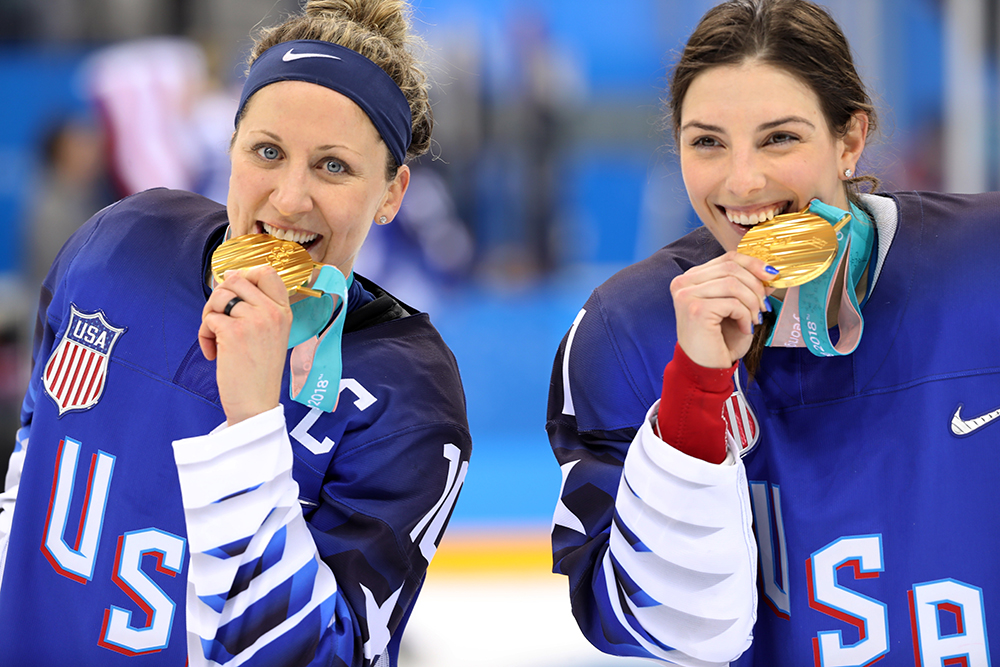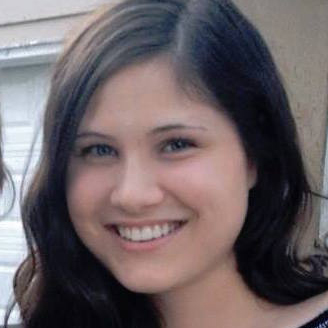
Meghan Duggan (left) celebrates with Team USA teammate Hilary Knight after beating Canada to win gold at the 2018 Pyeongchang Winter Olympic Games
2018 was a big year for U.S. women’s national ice hockey team member Meghan Duggan, both professionally and personally. Between captaining the gold medal-winning team at the Pyeongchang Winter Olympics in February—where Team USA defeated Canada, 3-2—and her September marriage to Canadian hockey player Gillian Apps (who was a member of the Olympic team that denied U.S. the gold in 2010 and 2014), Duggan’s name was frequently in the headlines.
However, Duggan’s the first to admit that 2018 was an outlier; she knows that coverage of women’s hockey generally only peaks every four years, during the Olympics. Same goes for women’s sports in general—which, according to a study from the University of Minnesota’s Tucker Center for Research on Girls & Women in Sport, gets less than 4 percent of televised sports coverage. “I think women have fought really hard for that 4 percent, which is unfortunate,” says Duggan. “I’d love to see it be 50 percent, but I think we’re a long way from there.”
That said, Duggan says visibility of women’s hockey in the media has improved since the start of her career. After playing at the University of Wisconsin, where she was recognized as the top women’s NCAA hockey player, Duggan was drafted in 2011 by the Boston Blades, then part of the Canadian Women’s Hockey League. She is now a member of the Boston Pride, one of the four original franchises of the National Women’s Hockey League, which was established in 2015. In addition to the 2018 Winter Olympics, Duggan has represented the U.S. at the 2010 and 2014 Olympics.
In a rare bout of coverage outside an Olympic year, Duggan and the women’s national team made headlines across the country in 2017, when they threatened to boycott the World Championships over stalled contract negotiations with USA Hockey. A new agreement was negotiated days before the championship games.
Duggan chatted with Nieman Reports about coverage of women’s hockey and how it can be improved. Edited excerpts:
On the state of women’s hockey coverage in the U.S.:
I think it’s starting to improve. Obviously, there’s a long way to go. NHL Network is starting to pick up some more games and some more tournaments.
With the 2018 Olympics being so successful, and about three million people tuning in to that final gold medal game [where the U.S. defeated Canada, 3-2, in a shootout], people are starting to realize that it’s a big-ticket sport.
What a lot of people don’t know, maybe because of lack of coverage, is that those two teams and those players play each other multiple times every year in other tournaments. The U.S. and Canada [had] a big rivalry series in February, where [we played] each other three times. To get three million people watching those games would be amazing. It’s the same teams. It’s just not the Olympics.
On threatening to boycott the 2017 ICHF World Championships to protest stalled negotiations with USA Hockey for fair wages and equitable support:
That was definitely a high coverage point for our team. It got picked up everywhere nationally. The media loves controversy, and they love drama. That was all of that wrapped into one.
We were thankful for that coverage. I don’t think we knew how widespread it would go, but that certainly helped in our campaign, having everyone in the nation talking about it, and standing in our corner.
On the importance of backstories and behind-the-scenes coverage:
I love seeing behind‑the‑scenes editions of anything with all sorts of athletes. I tune into all of that, big time. I think that’s a lot of what fans want to see—like “a day in the life,” or what’s the training like.
In this day and age, with social media and things like that, I think athletes do a great job on their own platforms, promoting and showing what they’re doing on a daily basis. You see the recognition and the pickup that that has with fans. I think promoting more of that kind of stuff [in the media] would be helpful.
I love following the backstories [of athletes]. I watch the NHL “Road to the Winter Classic” [series, which takes viewers behind-the-scenes to the dressing rooms and the homes of players] and all kinds of those mini-docuseries that they do following around players, and getting to know their families, or even their dogs, and things like that.
More of that would be really fun. The women’s soccer team tends to dabble in some of that. I think they’re probably one of the gold standards in women’s sports. I’d love to know more about the WNBA, what those women are doing behind‑the‑scenes, who their families are, things like that.
On media coverage of her wedding to Canadian rival Gillian Apps:
I think what I was happiest about was 99 percent of it was positive, and I think the world was recognizing a great thing, supporting it, and sharing great messages of congratulations. I certainly didn’t know it was going to go viral like that. It was the best day of my life.
On the impact of social media:
I think it’s a great way to connect with fans. I know my hometown of Danvers, Massachusetts loves when I share on social, because they love to know what I’m up to.
I think the growth, the positive comments, and everything that can come out of it outweighs the negative comments.
On coverage of the National Women’s Hockey League:
Coverage is not near where it could be. It’s like a startup. It’s like the Original Six, [the six teams that made up the national hockey league for 25 seasons between 1942 and the expansion of the league in 1967], back in the early days of the NHL. There’s definitely some smaller media outlets at the games and and they have different streaming services.
I think each year [since the National Women’s Hockey League was established in 2015], the teams and the league in general have gotten more and more coverage. The Minnesota [Whitecaps] are a brand new team but have sold out every home game.
On how a lack of media coverage impacts the development of women’s hockey:
You need to market the game more, and that costs money. As players, we need to sit down with people that work in marketing our sport and ask, what can we do? How can we work together? How can we continue to push this and get the word out, in all aspects?
Those conversations on our side are starting to happen. At the same time, as players, sometimes you need to be able to just focus on competing, focus on training, focus on the job you’re trying to do.

